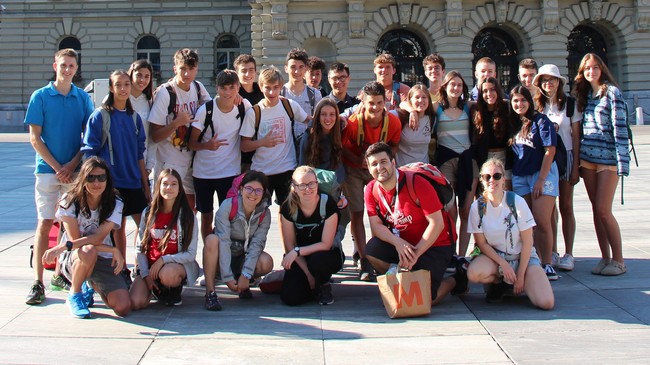
Religions form a united front

Switzerland's leading Christian denominations have joined forces with the Muslim and Jewish communities to create a Council of Religions.
They hope the pioneering project, to be launched in May, will help them find a common position on problem issues, such as the recent row over the publication of cartoons depicting the Prophet Mohammed.
“The globalisation of religion is a fact, and here in Switzerland we also have different cultures and religions,” said Markus Sahli, secretary-designate of the Council.
“Because Islam is the third-biggest faith community in Switzerland, it seems appropriate to create a platform for dialogue with this religious group,” he told swissinfo.
The Federation of Swiss Protestant Churches first proposed the idea a few years back. The general-secretary of the Swiss Bishops Conference, Agnell Rickenmann, said the Roman Catholic church was initially cautious as it was unclear what the body’s remit would be, but is now an enthusiastic participant.
Rickenmann said it was important to show society that the various religions in the country were not locked in conflict but were trying to work together for the benefit of all.
“At first the real issue will be to get to know each other a bit better and to enter dialogue. But it may be that in the future it will be important that the religions have a common position on social issues – bioethics, for instance.”
Advisory role
The Council will be chaired by Thomas Wipf, the president of the Federation of Swiss Protestant Churches. Bishop Kurt Koch will represent the Roman Catholics, and Bishop Fritz-René Müller the Old Catholics.
The Muslim community will have two representatives: Farhad Afshar of the coordination centre of Islamic organisations in Switzerland, and Hisham Maizar, president of the federation of Islamic communities of eastern Switzerland.
The Jewish faith will be represented by Alfred Donath, president of the Swiss Federation of Jewish Communities.
“The idea is first that we will work for religious peace in general, to sustain it and to anchor and promote it,” Donath told swissinfo. Other important goals were to improve understanding and trust among the religions, he said.
“And it will be the partner for our government. If they have a religious problem they can come to this group.”
Dialogue with Islam
The founding of the Council was announced shortly after the publication of the Mohammed cartoons in Swiss newspapers caused outrage among the country’s Muslim groups.
A further cause for tension was the decision by local authorities in northwestern Switzerland to block the construction of a minaret.
Muslims in Switzerland are concerned at a rise in anti-Muslim prejudice since the terrorist attacks of September 11, 2001, while some Swiss worry that the country’s 300,000 Muslims are not well enough integrated.
Rickenmann told swissinfo his church has long recognised the need for dialogue with the Muslims. He pointed out that the Swiss Bishops Conference set up its inter-religious working group before the events of September 11.
Donath stressed that as an established religious and cultural minority, Switzerland’s Jewish community was well placed to help the newer Muslim community integrate. The Council could help in that process, he said.
“We hope that moderate Muslims will also find their place in Swiss society,” Donath added.
For his part, Farhad Afshar told the NZZ am Sonntag newspaper he expected Jews and Christians to intervene on behalf of the Muslim community if the values of Islam were ridiculed by the media.
“In the Council of Religions Muslims, Christians and Jews should stress the main thing they have in common – and that is an obligation to seek peace,” he said.
swissinfo
The Council of Religions aims to contribute to religious peace in Switzerland, to foster understanding between the different faiths, to engage in dialogue on faith-related and social issues and to advise the government on these issues.
Initially the Council will be made up of representatives of the Roman Catholic Church, Old Catholics, Swiss Protestant Church, as well as the Muslim and Jewish communities. Evangelical churches, Hindus and Buddhists are not represented, but may join later.
Religious adherence in the Swiss population (2000):
Catholic: 42%
Protestant: 35%
Old Catholic: 0.18%
Orthodox: 2%
Other Christians: 0.19%
Jews: 0.24%
Muslims: 4.26%
Other religions: 0.8%
No religious affiliation: 11%
Unknown: 4.33%

In compliance with the JTI standards
More: SWI swissinfo.ch certified by the Journalism Trust Initiative
















![The four-metre-long painting "Sonntag der Bergbauern" [Sunday of the Mountain Farmers, 1923-24/26] had to be removed by a crane from the German Chancellery in Berlin for the exhibition in Bern.](https://www.swissinfo.ch/content/wp-content/uploads/sites/13/2025/12/01_Pressebild_KirchnerxKirchner.jpg?ver=cb688ed5)














You can find an overview of ongoing debates with our journalists here . Please join us!
If you want to start a conversation about a topic raised in this article or want to report factual errors, email us at english@swissinfo.ch.